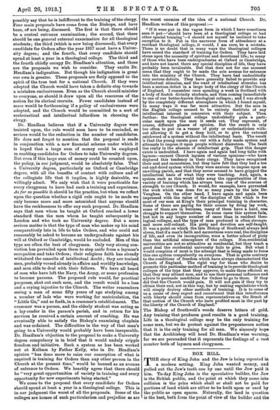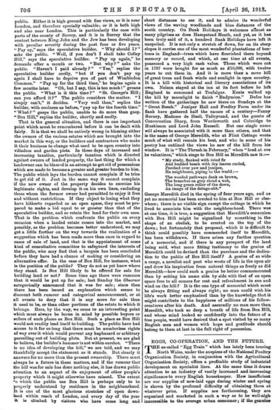BOX HILL.
THE story of King John and the Jew is being repeated in a modern setting. King John wanted money, and pulled out the Jew's teeth one by one until the Jew paid it him. To-day King John is the speculative builder, the Jew is the British public, and the point at which they come into collision is the price which shall or shall not be paid for portions of land which are either to be built upon or used by the public as open spaces. Naturally, the land in question is the best, both from the point of view of the builder and the public. Either it is high ground with fine views, or it is near London, and therefore specially valuable; or it is both high and also near London. This is particularly the case with parts of the county of Surrey, and it is in Surrey that the contest between King John and the Jew has been developing with peculiar severity during the past four or five years. " Pay up," says the speculative builder. "Why should IF " asks the public. "Well, if you don't I shall take Colley Hill," says the speculative builder. "Pay up again," he demands after a month or two. "But why ? " asks the public. "Haven't I paid already?" "Yes," replies the speculative builder coolly, "but if you don't pay up again I shall have to deprive you of part of Wimbledon Common." "Pay up for the third time," he begins again a few months later. "Oh, but I say, this is too much !" groans the public. "What is it this time ?" "St. George's Hill; can you afford it?" The public considers the matter. "I simply can't," it decides. "-Very well then," replies the builder, with coolness as before, "pay up for the fourth time." " What ? " gasps the public, unable to do more than gasp. "Box Hill," replies the builder, shortly and coolly.
That is the general situation, and there is one important point which must be remembered before it can be dealt with fairly. It is that we shall be entirely wrong in blaming either the owners of the various estates which are brought into the market in this way, or the builders and contractors who make it their business to change what used to be open country into villadona and garden plots. In these days of increased and increasing taxation, particularly taxation which is directed against owners of landed property, the Last thing for which a landowner can be blamed is an attempt to get rid of possessions which are made to become a greater and greater burden to him. The public which lays the burden cannot complain if he tries to get rid of it. Just in the same way it cannot complain if the new owner of the property decides to exercise his legitimate rights, and develop it on his own lines, excluding those whom the former owner had permitted to enjoy it free and without restrictions. If they object to losing what they have hitherto regarded as an open space, they must be pre- pared to make a bid equal to or greater than that of the speculative builder, and so retain the land for their own uses. That is the problem which confronts the public on every occasion when a landed estate comes into the market, and possibly, as the problem becomes better understood, we may get a little further on the way towards the realization of a suggestion which has been made more than once in regard to cases of sale of land, and that is the appointment of some kind of consultative committee to safeguard the interests of the public, who may find that a bargain has been concluded before they have had a chance of making or considering an alternative offer. In the case of Box Hill, for instance, what is the position of the public? They do not as yet know where they stand. Is Box Hill likely to be offered for sale for building land or not ? Some time ago there were rumours that it would be put up for sale; last Sunday the Observer categorically announced that it was for sale; since then there has been issued an explanation which seems to discount both rumour and categorical announcement, or at all events to deny that it is any more for sale than it used to be, or than other portions of the estate to which it belongs. Here, by the way, we come to an interesting point -which must always be borne in mind by possible buyers or sellers of such places as Box Hill. Such a place as Box Hill would not readily lend itself to building. The public have had access to it for so long that there must be numberless rights of way over it which would prevent any haphazard or arbitrary parcelling out of building plots. But at present, we are glad to believe, the builder's hammer is not within earshot. "There is no idea of developing the hill," we are told, and we may thankfully accept the statement as it stands. But clearly it answers for no more than the present ownership. There must always be a future in these matters, and if the rumour that the bill was for sale has done nothing else, it has drawn public attention to an aspect of its enjoyment of other people's property which it might otherwise have missed. The extent o which the public use Box Hill is perhaps only to be properly understood by residence in the neighbourhood. It is one of the most glorious stretches of open down- land within reach of London, and every day of the year at is climbed by visitors who have come long and
short distances to see it, and to admire its wonderful views of the waving woodlands and blue distances of the south country. On Bank Holidays it welcomes arinost as many pilgrims as does Hampstead Heath, and yet, as it has been truly said of it, a hundred Bank Holidays have left it unspoiled. It is not only a stretch of down, for on its steep slopes it carries one of the most wonderful plantations of box- trees in England—trees which have flourished there beyond memory or record, and which, at one time at all events, possessed a very high cash value. Those which were cut in 1797 were bought for as much as £10,000, with twelve years to cut them in. And it is more than a mere hill of great trees and fresh winds and sunlight in open country. It is a hill with historical and literary associations of its own. Nelson stayed at the inn at its foot before he left England to command at Trafalgar. Keats walked up the hill by moonlight to finish "Endymion." Defoe has written of the gatherings he saw there on Sundays at the "Great Beech." Juniper Hall and Fredley Farm under its flank have gathered half the names of a century—Fanny Burney, Madame de Stael, Talleyraaad, and the guests of Conversation Sharp, from Wordsworth and Coleridge ta
Huskisson and Lord John Russell. But one single name will always be associated with it more than others, and that is the name of George Meredith, who at Flint Cottage wrote
much of what will remain his best, and who in some of his poetry has outlined the views he saw of the hill from his window. It is "The Thrush in February," when "loud at eve he valentines," which sings to Box Hill as Meredith saw it :—
" My study, flanked with ivied fir
And budded beech with dry leaves curled, Perched over yew and juniper, He neighbours, piping to the world:— The wooded pathways dank on brown, The branches on grey cloud a web, The long green roller of the down, An image of the deluge-ebb."
George Meredith died in the spring of four years ago, and as yet no memorial has been erected to him at Box Hill or else- where; there is no visible sign except the cottage in which he lived to associate him with the neighbourhood. There was at one time, it is true, a suggestion that Meredith's connexion.
with Box Hill might be signalized by something in the shape of an obelisk, to be erected on the tap of the down ; but fortunately that proposal, which it is difficult ta think could possibly have commended itself to Meredith, has been withdrawn. If there arises any further question of a memorial, and if there is any prospect of the land being sold, what more fitting testimony to the genius of Meredith could be devised than the purchase and the dedica- tion to the public of Box Hill itself ? A genius of so wide a range, a novelist and poet who wrote of life in the open air and drew his inspiration from natural things as freely as did Meredith—how could such a genius be better commemorated than by setting his name side by side with that of an open space free to all comers for rest and refreshment in sun and wind on the bill? It is the one type of memorial which must
be always fitting and always right; no man could wish his life's work better emphasized than by the knowledge that it might contribute to the happiness of millions of his fellow- creatures after his death. And assuredly no man more than Meredith, who took so deep a breath of life from Box Hill,
and whose mind looked so confidently into the future of a free people, would have desired that a spot visited by so many English men and women with hope and gratitude should belong to them at last in the full right of possession.



























































 Previous page
Previous page